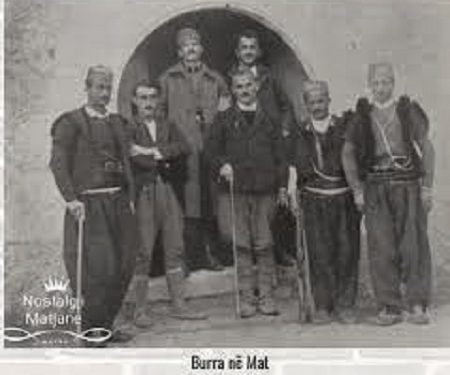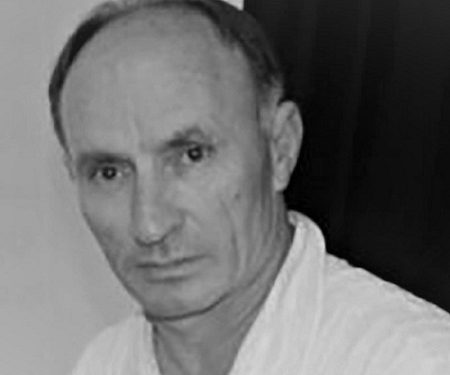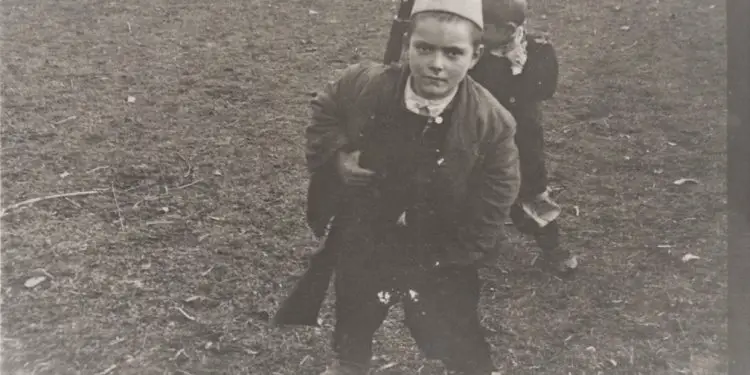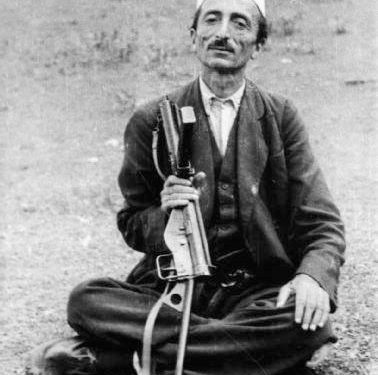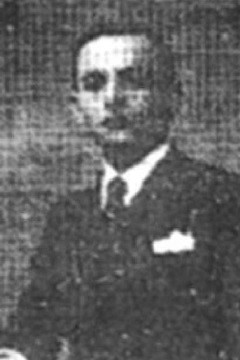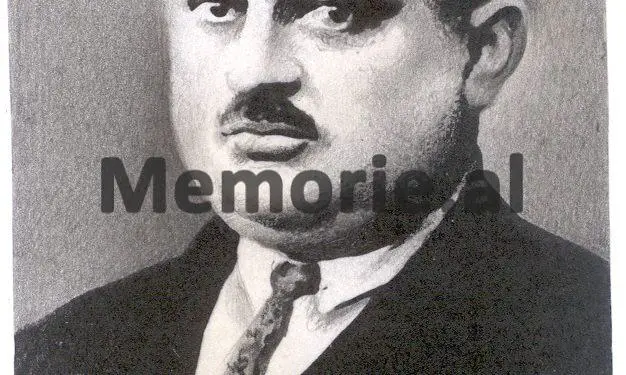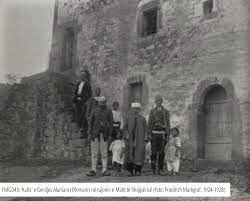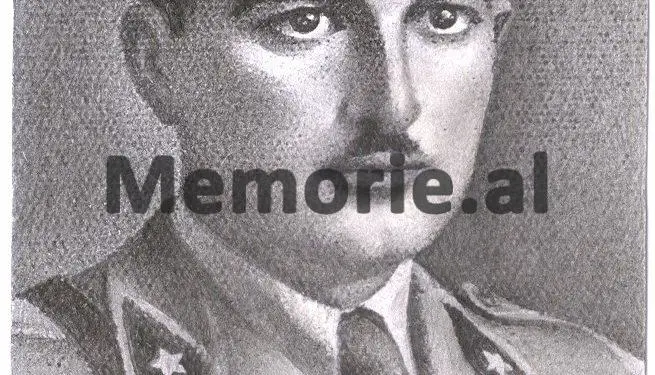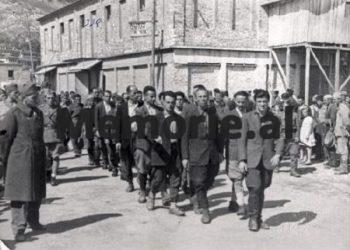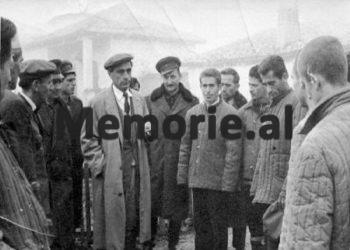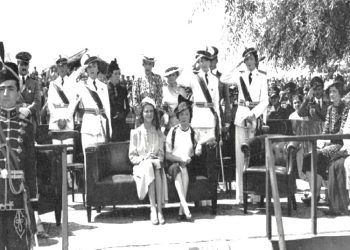By Xvehir Gradica
Memorie.al / Two generations of Allamans in the village of Kurdari in Burrel in the great province of Mati have been shot, sentenced to dozens of years in prison, exiled, burned and persecuted for 45 years, only because the heads of the village’s tribe refused to cooperate with the forces communist, in the defense of the lands from the Germans. Abaz Kup’s forces were sheltered in the Allaman palaces, on whose orders the English mission stayed for a few days in the harsh winter of 1944. Isuf Allamani and Dyl Allamani would be placed in front of the black battalions, one thread behind liberation, and the second before the year was over. After them, Man Allamani, Selman Alamani, Sherif Allmani, Petrit Allamani and Asllan Allamani, would be sentenced for “agitation and propaganda and attempted escape”, suffering in the dungeons of the Albanian State Security and in the cells of Spaçi Burrel prison.
A family all extinguished…!
Sixty years in prison, five high towers burned, the two most famous men of the Allamani tribe, shot and dozens of cattle seized along with all the wealth of those houses. Eduart Allamani, the son of Petri Allamani, sentenced to 20 years in prison, says that his tribe was killed, imprisoned and burned, just because they were nationalists. The remains of Isuf Allamani, killed at Ura e Beshir, were buried for 48 years, staying away from the family, until 1992.
The same fate, but more bitter, had Dyl Allamani, who was shot in 1945, in the first spring after the end of the War, and since then, the remains of the well-known patriot have not been found! Of all the convicts who have unleashed horrors in the prisons of the dictatorship, only Asllan Allamani remains, who lives with his daughter in Tirana, while the towers in the village known for patriotism, (Kurdari t Matit), and have been rebuilt after the overthrow of the system communist.
Many stories have been written about the endurance of the Matjans and especially about the resistance of the men of Isuf and Dyl Allamani’s tower, some of which have survived to this day as they have been passed down word of mouth. They convey the men’s determination to defend with their lives to the death, the province of Mati. Other stories and episodes prove the power of the word of Isuf, Dyl and Selman Allamani, who sacrificed everything for the honor of their country, against the Italian-German invaders.
In the war of Mati, known as the war of the Albanian nationalists against the Nazi German forces, Man Allmani was wounded, while the nationalist forces forced the invader to withdraw. There are other materials that have arrived to date, which prove that gold napoleons were paid to “get rid of” Dyl Allaman, because of the power he had in Kudari, Patin, Lis and Dibra e Madhe e e Vogël. The Allamans, based on the Matian expression “Matians free themselves, without the need of foreigners”, did not support either Haxhi Lleshi or Shefqet Peçi, who could not pacify the Allamani brothers from the village of Kurdari.
Twice the burning of the towers was provoked, only to be burnt down in 1945, after a march of an entire partisan battalion led by Mehmet Shehu, who killed 18 men of the village and burned all the towers of the Allamans, as a sign revenge, leaving the women, children and elders of the tribe, in the cold, frost and snow, without any support. Dyl Allamani, seeing the ferocity of Mehmet Shehu, decided to surrender to save his grandson’s men from the bullet.
Haxhi Lleshi’s grudge against the Allamans…!
The 50-year-old Dyl Allamani was brought to Tirana and was executed at night in Breg Lum of Tirana, but was unable to end the enmity with the communist regime. The friendship and fraternity with Myslim Peza could not save the man of the famous tower of Allaman, to end up shot dead, even though the commander of the Peza detachment was able to convince Enver Hoxha to spare Dyl Allaman’s life… ! The old grudges of Haxhi Lleshi with the Allamans were stronger than the prayers of Muslim Peza!
“If you’re not going to shoot Dyl Allamani, kill me,” Haxhi Lleshi is said to have said this to the commander-in-chief, Enver Hoxha, whose influence was decisive for the fate of the 50-year-old Allamani’s life. The communist regime that had just come to power had left aside the patriot Suljeman Allmani, father Dyl, Isuf, Selman and Shahin Allaman, who was killed in Shkodër, while fighting against the Serbo-Montenegro invasions. The communist regime covered the name of this great patriot with oblivion, only to be remade once more only in the years after the fall of the dictatorship. Sulejman Allmani, has been decorated with the title “Martyr of the Fatherland”, restoring glory and honor to the towers of the Kurdari village of Burrel.
Firing
The brothers Dyl, Isuf, Selman and Shahin Allamani, during the resistance against the foreign invaders, (1939-1944) supported and supported the nationalist forces of Legality, commanded by Major Abaz Kupit. The Allamans had great influence in the Kurdari of Burrel and friendship with very well-known and strong tribes (in rifle and pen) not only in the province of Mati, but also more widely throughout Central Albania and Northern Albania. Among them, we can mention the connection they had with the well-known Deliallisi tribe in Shijak of Durrës, due to the spirit and nationalist beliefs of the two tribes, a connection which would become the cause and cost the lives of two of the men of the Matjan tribe.
Isuf Allamani, had completed his higher studies in Florence, Italy, for Veterinary Medicine and there in the neighboring country across the Adriatic, he had met the Italian Leonela, with whom he had only one son, since Isufi, would be shot by the communist regime at the age 37 years old. During the years 1936-1944, Isufi was the director of Xhafzotaj Farm and there he bred the best breeds of cattle. It was during this period of time that I started getting to know the Deliallis family, who had made a bad impression among the communists in the Durrës district.
Educated in Florence, he has left a series of manuscripts, which are expected to be published very soon and which may be valuable for the audience of students of the Zooveterinary branch of the Agricultural University of Tirana. Immediately after the end of the War in 1944, his brothers began to be seen with suspicion, as they had organized resistance against the partisan forces, not letting them enter the village of Kurdari, while for several days, by order of Abaz Kup, they kept the English mission in their towers. Two or three days after the end of the War, there from November 30, 1944, in the house of Isuf Allaman in Xhafzotaj near Shijak, in complete secrecy, the friends of his tribe, Jakup and Kapllan Deliallisi, who were staying illegally on the run, as they were in constant pursuit by the forces of the Pursuit Division.
A few hours after the men had started the conversation, Allaman’s house is surrounded by the forces of the Pursuit Division and those of the State Security, which managed to forcefully kidnap the two Delillis men. But Isuf Allmani, could not withstand the temptation of forcibly taking the friends of the house, from the guest house of his tower. Thus, he decides to go with the Deliallis, who had put in the middle, the operatives of the Follow-up Forces of the People’s Protection Division, accompanying them under strict security measures.
Only with the fall of the communist regime, after the 90s, the former senior official of the communist regime, Sali Verdha, (former commissioner of the Partizan Group of Peza in 1943-’44), told the Allamans that Isuf Allmani and Jakup and Kapllan Deliallisi, were shot at Ura e Beshiri and put in a pit of three, which made it possible for them to be found, to be reburied 48 years later, in 1992. Isuf Allamani , the 37-year-old educated in Italy, stepped in front of the gunmen to protect his friends who kidnapped him at home and was shot first by the firing squad. The Italian woman and his son, Allaman Allmani, left Albania a year later, in 1945, never to return to this country until the years of democracy.
Leonela, until her death, did not believe that her husband, Isuf Allmani, had been shot and always said to her son, Allmani: “How come your father didn’t come once to see us and meet us?!”. After him, the turn would be Dyli, the older brother of the Allamans. All five towers, under the same high wall, escaped fire in 1994, after the commander of the partisans of the 5th Assault Brigade, Shefqet Peçi, was unable to set fire to them. After him, Haxhi Lleshi also failed. Dyl, had had problems with Zogu years ago, as it was said that he had a hand in the instigation of Beqir Valter, for the assassination of God in the Parliament in 1923. To escape arrest by the gendarmerie forces, Dyl Allamani fled to Dibër Madhe and there he meets Myslym Peza, with whom they drink blood and become brothers, like beer lovers. But the enmity with Haxhi Lleshi would cost him a lot a few years later.
The Allamans of Kurdaria were cousins with the strong tribe of Çelas, while the towers of the two sides entered into enmity and this was exploited by Haxhi Lleshi, who was not allowed to enter Mat during the War, by Dyl Allmani and other Matan nationalists. After him, in Kurdari, Burrel and Mat, Mehmet Shehu went with the forces of the First Assault Division that he commanded and upon arriving there, he decided to kill all the elders, women and children of the Allamans, unable to capture the main heads of the tribe, who had gone up to the mountain. After setting fire to the houses, he prepared a firing squad, but the hostages were able to escape as an order from Tirana forced Mehmet Shehu to retreat, leaving the village engulfed in screams and smokes from the burning towers. .
The Allamani had been able to convince the Çele for reconciliation and had forgiven their grandchildren, half of the Allamani Mountain, a sign of unity against the German invader. Under such pressures, Dyl Allmani decides to surrender, to save his nephews from the persecution of the communist regime that has just come to power. He took over the resistance that had been given to the communist partisan forces and based on this he was sentenced to be shot, to be executed in the spring of May 1945, on the day of Eid in Breg Lum of Tirana. A few years later, his remains were taken by the river, as according to some testimonies, a pit was opened by the stream and at a small depth. Myslym Peza had less influence on Enver Hoxha than Haxhi Lleshi, as the latter made all efforts until he shot Dyl Allmani. At the time Dyli was shot, Selmani, the other brother, also ended up in prison, suffering in a cell and under torture, for several years while serving his prison sentence.
Arrests and imprisonments
The Allamans were a family with a great name in the province of Mati as they were connected to strong, nationalist and patriotic tribes. They were friends with the Kaloshi, Ndregjoni and Reçi tribes in Dibër and with Selmani, Çela and Valtëri in Mat, all tribes known for their nationalist attitudes and as strong supporters and supporters of the Monarchy and the former King Zog. Exactly, such a connection burdened these well-known tribes even more, prompting the communist regime to pursue and persecute almost all the men and boys of the Allamani tribe. Based on this, in 1970, Dyl’s son, Petrit, nephews, Sherif and Asllan, together with their cousin, Man Allama, were arrested and imprisoned.
After a special investigation, they appeared in court, which convicted them even without evidence, under the charge of propaganda agitation and escape attempt. The sheriff was sentenced to 22 years in prison, Petriti to 20 years and Asllani to 15 years, and all three were sent to Burrel e Spaç together to serve their sentences. The uprising of Spaçi in May 1973 also kidnapped Sherif Allamani, who was sentenced again, being accused of being an active participant in that revolt. The second generation of the patriotic Allamani family spent years in the centers of severe persecution, while their children suffered in the contempt of the regime, not having the right to education and equality in society.
Strangely, the regime aimed to eradicate everything related to the recall of the Allamani manhole. All the trials against them were fabricated with false witnesses. Allamanëve’s grandson, Eduarti, (graduated in Law after the fall of communism), has shown that the key witness for his father’s 20-year prison sentence was his friend. “It was the father’s friend who was processed by the investigators to testify in the trial, things that are not true at all. But he was an honest man and he could not stand the crime, ending up under the tires of the car in front of people”, – says Eduarti about the tragic event.
After destroying the lives of the heads of the tribe by putting them in prisons and mines, the communist regime took away all the freedoms of even the grandchildren and great-grandchildren, while Mali Allaman would not bear this name for many years. By means of an official decision, this mountain, from the time when the attack and persecution of the Allamans began, until 1992, would be called the “Mountain of Kurdaria” and anyone who would be mistaken, calling it by the known name historically, it would be punished. Witnesses of the resistance of the Allamans, against the invader, are the testimonies throughout the province as well as the Mat e Lusa River itself, a threshold of resistance for Kurdaria.
The crimes of the regime, the sufferings, the punishments, the imprisonments, the tortures and the survival of the Allamans, have taken place in the book of Eqrem Bej Vlora “History of Albania”, in that of Juli Amery, a former English missionary near Abaz Kup during the War of the year 1943-44, with the title: “Sons of Shqipe”, as well as in dozens of pages and documents of the state archives, without including writings and books, such as the novel of the well-known prose writer, Shpendi Topallaj, “Allamanët”.
Shefki Allamani was also sentenced to 10 years in prison, as a nationalist (close cousin of Dyl Allmani and Isuf Allmani, who was shot in 1944 and 1945). In all cases, it is emphasized that the Allamans, during a century, have been killed together with the Serbs and the communist regime, in order to preserve the national and nationalist principles.
On November 16, 2009 in Tirana, in the framework of the 65th anniversary of the Day against Torture, organized by the Presidency of the Republic and the American Embassy in Tirana, 38 intellectuals shot in 1944-1945 were decorated. In those days, the former president of the Republic, Bamir Topi, would decorate with the title “Honour of the Nation”, the well-known intellectual and patriot, Isuf Allamani, who was shot in 1944. In that ceremony, in addition to dozens of guests, assisted also pinjolle of the tribe Çela, Lisi, Patini, Kaloshi, Ndregjoni, etc., with whom the towers of the Allamans were connected and survived. Memorie.al




